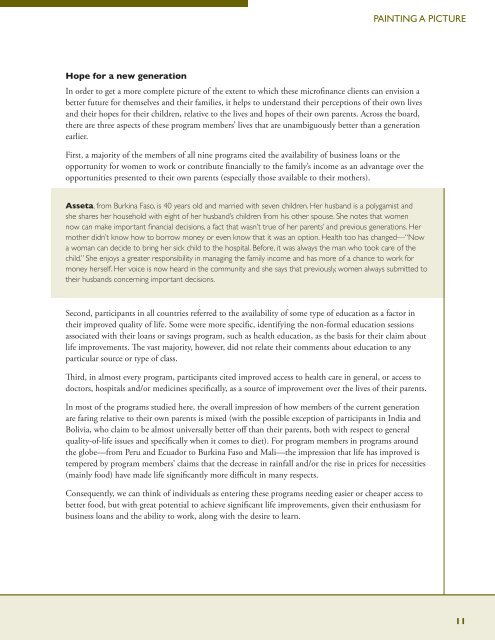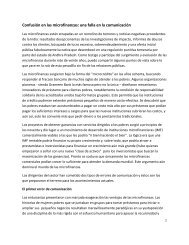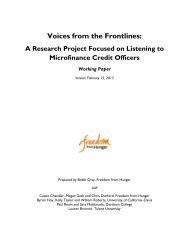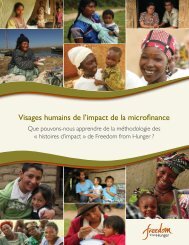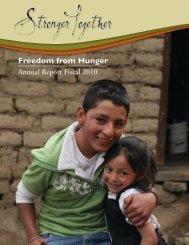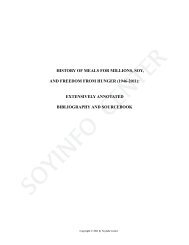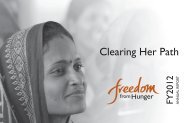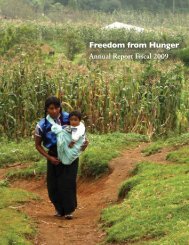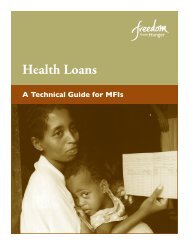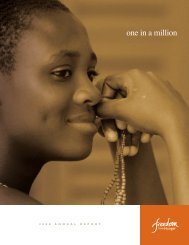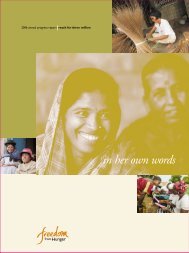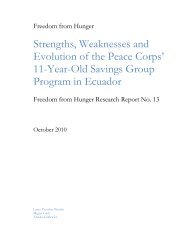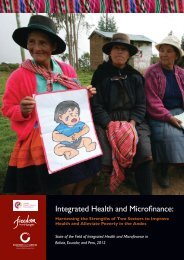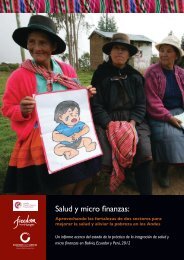English - Freedom from Hunger
English - Freedom from Hunger
English - Freedom from Hunger
You also want an ePaper? Increase the reach of your titles
YUMPU automatically turns print PDFs into web optimized ePapers that Google loves.
PaInTIng a PICTuRe<br />
Hope for a new generation<br />
In order to get a more complete picture of the extent to which these microfinance clients can envision a<br />
better future for themselves and their families, it helps to understand their perceptions of their own lives<br />
and their hopes for their children, relative to the lives and hopes of their own parents. Across the board,<br />
there are three aspects of these program members’ lives that are unambiguously better than a generation<br />
earlier.<br />
First, a majority of the members of all nine programs cited the availability of business loans or the<br />
opportunity for women to work or contribute financially to the family’s income as an advantage over the<br />
opportunities presented to their own parents (especially those available to their mothers).<br />
Asseta, <strong>from</strong> Burkina Faso, is 40 years old and married with seven children. Her husband is a polygamist and<br />
she shares her household with eight of her husband’s children <strong>from</strong> his other spouse. She notes that women<br />
now can make important financial decisions, a fact that wasn’t true of her parents’ and previous generations. Her<br />
mother didn’t know how to borrow money or even know that it was an option. Health too has changed—“Now<br />
a woman can decide to bring her sick child to the hospital. Before, it was always the man who took care of the<br />
child.” She enjoys a greater responsibility in managing the family income and has more of a chance to work for<br />
money herself. Her voice is now heard in the community and she says that previously, women always submitted to<br />
their husbands concerning important decisions.<br />
Second, participants in all countries referred to the availability of some type of education as a factor in<br />
their improved quality of life. Some were more specific, identifying the non-formal education sessions<br />
associated with their loans or savings program, such as health education, as the basis for their claim about<br />
life improvements. The vast majority, however, did not relate their comments about education to any<br />
particular source or type of class.<br />
Third, in almost every program, participants cited improved access to health care in general, or access to<br />
doctors, hospitals and/or medicines specifically, as a source of improvement over the lives of their parents.<br />
In most of the programs studied here, the overall impression of how members of the current generation<br />
are faring relative to their own parents is mixed (with the possible exception of participants in India and<br />
Bolivia, who claim to be almost universally better off than their parents, both with respect to general<br />
quality-of-life issues and specifically when it comes to diet). For program members in programs around<br />
the globe—<strong>from</strong> Peru and Ecuador to Burkina Faso and Mali—the impression that life has improved is<br />
tempered by program members’ claims that the decrease in rainfall and/or the rise in prices for necessities<br />
(mainly food) have made life significantly more difficult in many respects.<br />
Consequently, we can think of individuals as entering these programs needing easier or cheaper access to<br />
better food, but with great potential to achieve significant life improvements, given their enthusiasm for<br />
business loans and the ability to work, along with the desire to learn.<br />
11


